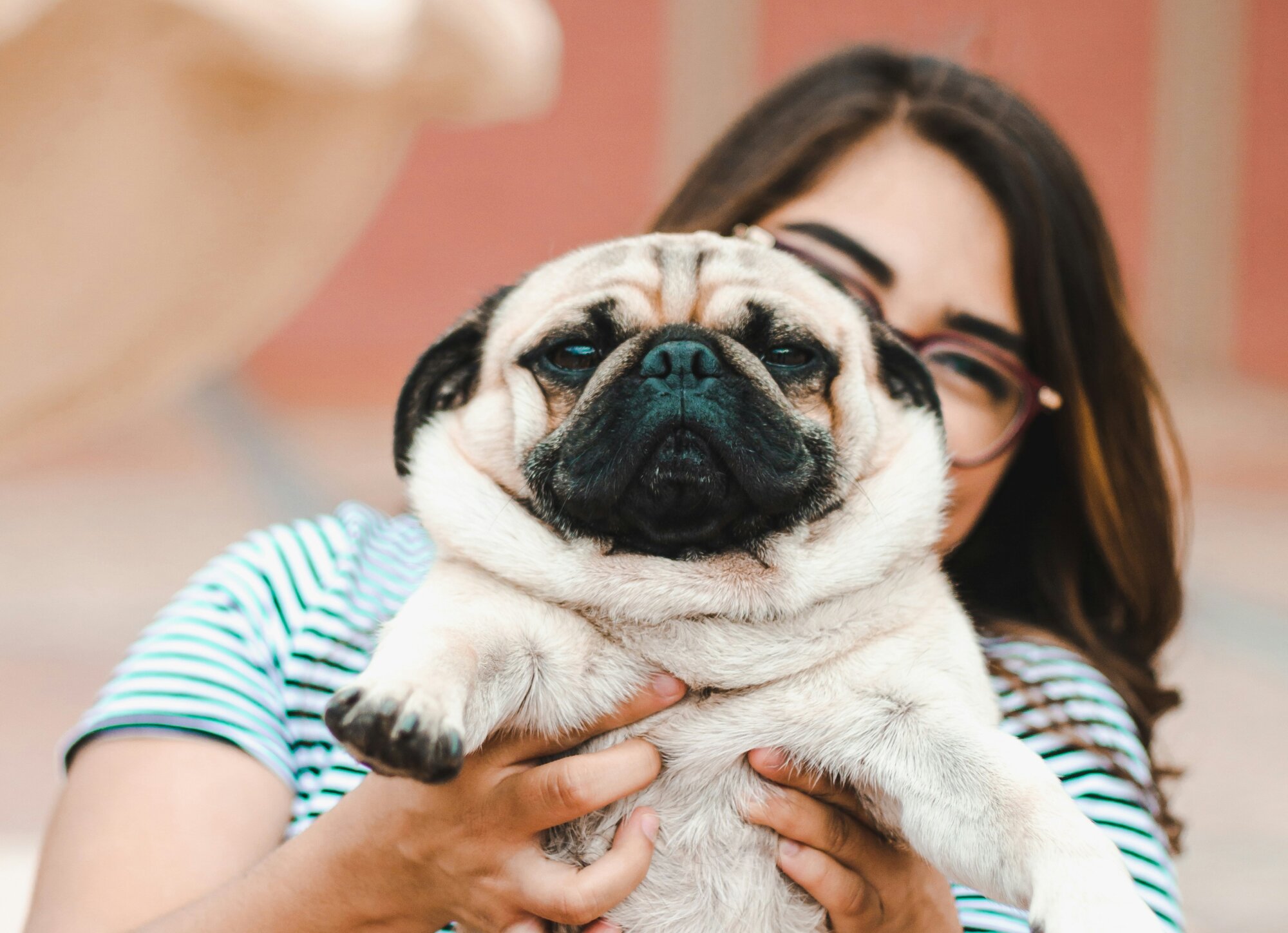Most pet parents know about the risk of their pet getting fleas. And, maybe your pet has suffered from fleas in the past. But have you ever wondered if humans can get fleas from dogs?
In this article, we answer the question, "Can humans get fleas from dogs?" Plus, we'll cover 5 signs of fleas and how to get rid of a flea infestation.

Can humans get fleas
While fleas prefer to live in your pet's fur, it's possible for humans to be bitten by a dog flea. These tiny parasites secrete saliva and cause issues like flea allergy dermatitis, itching, scratching, and secondary infections.
But, most fleas cannot live comfortably in human hair. Most fleas prefer dark, warm environments. Human hair usually does not have this environment for fleas to live in.
Plus, female dog fleas need dog blood to lay eggs and survive. But, a dog flea may still jump onto a human to try things out.
However, most adult fleas figure out quickly that a human's hair and skin isn't the ideal environment to nest. According to the CDC, fleas can infect humans if they are accidentally swallowed. This may happen while playing outdoors or with an infected pet.
Fleas on humans are commonly mistaken for bed bugs. Bed bugs are brownish-red, flat, and shaped like a seed. Fleas are also brownish-red, but they are more oval, making them look skinnier and longer instead of flatter.
The risk of fleas
Although a human isn't an ideal habitat for the flea species, they may still bite your skin. Aside from flea bites being extremely itchy, adult fleas transmit diseases that may harm you and your pet.
Flea bites are the most common way for humans to suffer from a secondary infection or a flea-borne illness. Some diseases fleas may carry include:
- Flea allergy dermatitis (FAD)
- Flea-borne parasites like tapeworms
- Flea-borne spotted fever
- Murine typhus
- Bubonic plague
Not every dog flea carries these diseases. But, rodent and cat fleas might. If a flea problem is not addressed immediately, it can turn into an infestation for your pet and your home.

Signs of dog fleas on humans
If a flea jumps on to you from your pet, they likely won't stay for long. But, there are some signs of fleas on humans to look for.
1. Adult dog fleas

Adult fleas are small, dark brown insects around 3 mm long. Whether you find a dog flea or a cat flea, male and female fleas alike can carry diseases that can harm your pet.
2. Flea bites

Flea bites look like itchy, red bumps on your skin. They may appear in clusters or in a straight line.
Flea bites are commonly found on the lower half of your body. But, be sure to check all over for bites.
What does a flea bite look like on a dog
On dogs, flea bites look like small, red bumps or scabs on your pet's skin. Fleas bite other pets, including cats and rodents.
Look for flea bites in these common areas on your dog:
- Belly
- Groin
- Armpits
- Legs
- Tail
It can be tricky to spot fleas on your pet's skin, especially if your dog has long, thick fur. Part your pet's fur and look for signs of a flea bite like excessive itching and scratching.
What does a flea bite look like on a human
On humans, flea bites look like other insect bites from bed bugs, mosquitoes, or other pests. Bed bug bites and mosquito bites are itchy and red, but typically not sore or painful.
The main difference is that a flea bite may have a burning sensation around the bite and feel sore. Flea bites may also cause fevers and infections in humans.
Treating flea bites
To treat flea bites, wash the area with soap and water. Take Benadryl for a quick fix to soothe your symptoms.
Use an antiseptic soap to disinfect the human flea bites and try your best not to itch. Over time, the flea bites will heal.
It is possible for people to contract diseases when fleas bite humans. If you notice any signs of disease or infection, visit your doctor right away.
3. Flea dirt

Flea dirt, also known as flea droppings and flea feces, look like brown specks on your dog's fur and skin. An adult flea leaves behind flea dirt when they feed.
Flea dirt is a common way to identify a flea problem. It’s also normal to find flea dirt before you find the fleas themselves.
4. Flea eggs and larvae

After fleas lay eggs, they hatch and grow into flea larvae. Flea larvae then grow into adult fleas. A female flea can lay up to 50 flea eggs per day.
Flea eggs are almost impossible to see with the naked eye. But, flea larvae look like tiny worms, and are a little bit easier to see. However, larvae can be tricky to spot because they burrow in carpets and cracks.
5. Allergic reaction

Similar to its effects on dogs, flea saliva can cause allergic reactions in humans:
- Itching and scratching
- Irritated skin
- Hair loss
- Body aches
- Fever
- Secondary infections

How to get rid of a flea infestation
It can be tricky to get rid of a flea problem. Heavy flea infestations require special attention and a curated treatment plan.
Knocking out all stages of the flea life cycle is the only way to get rid of fleas and keep them from coming back. Cyclekiller is our proven method to eliminate them.
Get everything you need to get rid of fleas delivered to your door with overnight shipping.

Adult female fleas lay eggs within 24 hours of nesting in your home and on your pet. That's why getting rid of fleas quickly is important to keeping your home flea-free.
To effectively get rid of fleas in your home, use the following tips.
1. Gather the right tools.
To get rid of fleas on dogs and in your home, you'll need the right tools. Here are a few items to keep on hand:
- A flea comb
- Soap and water
- Gloves
- Household flea spray
- Flea and tick treatment
2. Remove fleas from your dog.
Scan your dog's skin carefully to look for fleas. If your dog has fleas, you may spot fleas, flea dirt (flea feces), flea eggs, and flea larvae hiding in their fur.
Use a flea shampoo to bathe your dog. Use a flea comb to carefully remove the fleas from your dog's coat.
Keep the comb in warm, soapy water to kill the fleas. Be sure to check all areas where fleas like to hide including your dog's:
- Ears
- Neck
- Stomach
- Armpits
- Legs
- Tail
3. Treat any signs of infection.
Treat all areas where a flea bit your dog's skin. Flea bites look like small, red bumps. The more your dog scratches the flea bites, the more irritated they become.
Use antiseptic soap to wash your dog's flea bites. You can also try applying a cold compress to relieve swelling.
VET TIP
If your dog is still itching after the fleas are removed, talk to your vet about using Benadryl, itch creams, and lotions to soothe your pet.
4. Vacuum and clean your home.
If your dog has fleas, your home does too. To completely eradicate any fleas hiding in your home, start with washing your dog's bedding and toys with warm, soapy water.
Vacuum all carpets and rugs in your home, and disinfect hard surfaces like wood floors and countertops.
After vacuuming, discard your vacuum cleaner bag in an outdoor trash can. Then, soak it in warm, soapy water to kill any fleas left in the bag.
5. Safeguard your home with household spray.
When your home is clean, use a household flea spray as pest control to safeguard your home. Household sprays prevent future infestations of fleas and other small insects like ticks, cockroaches, and ants.
To effectively use a household spray, remove all pets and humans from the infected flea area. Spray all surfaces where fleas can nest and hide including:
- Bedding
- Pillows
- Blankets
- Furniture
- Floors
6. Choose the right flea treatment for your dog.
The best flea treatments kill fleas and prevent them from biting in the future. To get rid of fleas for good, keep your pet on a monthly prevention plan with the right treatment.
There are plenty of options for pet parents to end the flea life cycle, including:
- Wearable treatments
- Oral treatments
- Topical treatments like Wags Advance® for Dogs
Already have flea protection but still fighting fleas?
Pair your treatment with PetFriendly's Rapid Flea Removal Kit to effectively eliminate fleas on your pet and in your home.

7. Stick to a flea prevention plan.
When choosing a treatment plan for your pet, consider:
- Your budget
- You and your pet's lifestyle
- Your pet's needs
Most of all, choose a treatment you will stick with. An option with monthly delivery may help you remember to apply your pet's treatment.
Although it's possible for humans to get fleas from their pets, it's unlikely. The best way to prevent contracting fleas is to prevent them from biting your pet in the first place.


